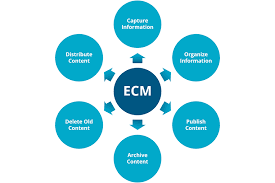
Introduction
The healthcare industry is heavily regulated, with stringent requirements to protect patient data and ensure operational transparency. Compliance with regulations like the Health Insurance Portability and Accountability Act (HIPAA) is not optional but a mandatory aspect of healthcare operations. For healthcare payers, maintaining regulatory compliance is a continuous challenge that demands robust solutions. Enterprise Content Management (ECM) systems are pivotal in helping healthcare payers manage their information efficiently and securely, ensuring compliance with regulatory standards.
The Role of ECM in Regulatory Compliance
Audit Trails
Audit trails are essential in maintaining compliance and operational transparency. They provide a detailed log of all activities related to patient data, ensuring that every access, modification, and transaction is recorded. ECM systems offer comprehensive audit trail capabilities, allowing healthcare payers to:
Access Controls
Access control mechanisms are fundamental to protecting sensitive patient data. ECM systems offer robust access control features that ensure only authorized personnel can access specific information. Key aspects include:
Data Security
Ensuring the security of patient data is paramount in healthcare. ECM systems incorporate various data security features to protect sensitive information from breaches and unauthorized access:
Comparison of ECM Providers: Newgen vs. Others
When it comes to ECM solutions in the healthcare domain, Newgen stands out with its comprehensive and innovative offerings. Here's how Newgen differentiates itself from other ECM providers:
User-Centric Design
Newgen: Newgen’s ECM solutions are designed with a user-centric approach, ensuring ease of use and efficiency. The interface is intuitive, reducing the learning curve and enhancing user adoption across the organization.
Others: While other ECM providers also focus on usability, Newgen’s emphasis on a seamless user experience is often highlighted as a key differentiator by its clients.
Customizability
Newgen: Newgen offers highly customizable solutions tailored to the specific needs of healthcare payers. This flexibility allows organizations to configure the ECM system to align perfectly with their workflows and compliance requirements.
Others: Many ECM providers offer customizable solutions, but Newgen’s ability to deeply integrate with existing systems and processes sets it apart.
Comprehensive Compliance Features
Newgen: Newgen’s ECM solutions come with a robust suite of compliance features out-of-the-box. This includes advanced audit trails, dynamic access controls, and extensive data security measures, ensuring healthcare payers can meet HIPAA and other regulatory requirements with ease.
Others: While competitors also offer compliance features, Newgen’s integrated approach and continuous updates to meet evolving regulations provide a comprehensive compliance framework.
Scalability
Newgen: Newgen’s ECM systems are highly scalable, accommodating the growing needs of healthcare payers. Whether it’s handling increasing volumes of data or expanding to support additional users and functionalities, Newgen’s solutions are designed to grow with the organization.
Others: While scalability is a common feature among ECM providers, Newgen’s architecture is often praised for its ability to scale without compromising performance or security.
Integration Capabilities
Newgen: Newgen excels in integration capabilities, allowing seamless connectivity with other healthcare IT systems, including Electronic Health Records (EHR), billing systems, and patient management systems. This integration ensures a unified information ecosystem, enhancing operational efficiency.
Others: Other ECM providers also offer integration capabilities, but Newgen’s extensive library of connectors and APIs, along with its strong support for interoperability standards, provides a more streamlined and effective integration experience.
Conclusion
In the complex and highly regulated healthcare industry, ECM systems are essential for ensuring regulatory compliance and protecting patient data. Newgen’s ECM solutions stand out in the market with their user-centric design, customizability, comprehensive compliance features, scalability, and robust integration capabilities. By leveraging these advanced features, healthcare payers can not only meet regulatory requirements but also enhance their overall operational efficiency and data security. Investing in a reliable ECM solution like Newgen’s is a strategic move that can provide long-term benefits in the ever-evolving landscape of healthcare regulations.
About GHIT Digital
GHIT Digital is a domain-focused, future-ready, boutique IT Services & Digital Transformation firm. We are a Minority and Women Owned (MWOB) small business from New Jersey, USA. Diversity, Inclusion, and Growth is our mantra. Team GHIT works on strategic IT projects for Government (G), HealthCare (H), Insurance (I), and Technology (T) clients, thus the brand GHIT. We are nimble, scalable, and sell & deliver with Platform Partners & Delivery Partners. Our niche capabilities include Agile Project Management, Infrastructure Services, Data Services, Cloud-native Data and Apps Implementation, Integration, Migration, Security & Optimization.
Contact Us
MonMass, Inc. (the legal name of GHIT Digital) will work on your strategic IT projects or consulting requirements (NAICS codes 541511 / 541512 / 541330 / 541618). Feel free to call 201.792.8924 or 646.734.6482 or write to me at Monika@GHIT.digital for a no-obligation discovery conversation. You are welcome to share your RFPs/RPQs for us to review and respond on time.
Monika Vashishtha, MBA, ITIL, PMP
President & COO
https://ghit.digital | Monika@GHIT.digital